COVER- Strike three? Has McIntire softball been benched?
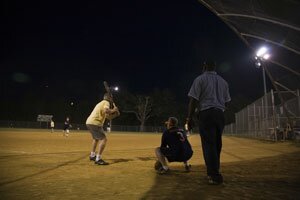
An early 1990s upgrade lit the softball fields at McIntire Park, but players have now been told that their days here are numbered.
PHOTO BY RYAN HOOVER
"It takes three hours to play softball– one to play, two to talk," chuckles catcher Alan Hughes as his team– representing Beck Cohen heating and air– gathers around an open tailgate one Sunday in June.
Teammates toss Gatorade bottles back and forth, children gather bats and gloves for dads, and wives cheerfully snap pictures. But even as the team huddles in the bright sun to discuss game strategy, a dark cloud looms in the background: a plan to push players off the turf they've enjoyed for decades.
"It's hard to understand," Hughes says. "These fields have been used for 15 to 20 years. I grew up here. It brings people together in the community– kids and adults."
A win-win situation?
The recently approved McIntire Park master plan, green-lighted in late May at City Council, includes several changes, including a new YMCA building on the site of two of the park's three existing picnic shelters. But no changes loom as large for some locals as the decision to convert the two softball fields at McIntire Park into a single, rectangular, multi-use, artificial-turf athletic field.
"Not only do the fields die, the place where Charlottesville softball began dies as well," says Beck Cohen player Chad Dillon.
City officials say they have a larger picture to consider.
"From a general use standpoint, we have more participants in football, lacrosse, field hockey, and soccer," says Charlottesville Director of Parks and Recreation Mike Svetz. "The City did a needs assessment in 2005, and– compared to population assessments and national standards– we identified there was a greater need for rectangular fields rather than diamonds."
Svetz says there's a move afoot to offer replacements by bringing lights to the nearby softball field at Charlottesville High School as well as lighting the three existing softball fields at Darden Towe Park, east of town.
"We want it to be a win-win situation," says Svetz, "where we meet needs with a rectangular field and maximize the use of the fields the city and county own."
Rumblings of change
As the Beck Cohen team shuffles onto the field to warm up, boys join dads in a catching drill while daughters, wives, and girlfriends wander in and out of the dugout sipping sports drinks and wiping sweat from sunglasses. When the opposing team fails to gather enough players for a game, a few Beck Cohen players genially switch sides.
The proposed changes to McIntire surfaced in a City Council meeting November 5, when a ground lease signed by the city, county, and YMCA was presented. In the months that followed, the layout of the park was the focal point of the McIntire Park advisory review team headed by Svetz. Public meetings took place March 4, April 12, May 6, and finally on May 19, when the McIntire Park Master Plan was approved by City Council.
Critics of the change say this is when participants in the softball league– a diverse mix of over 2,000 players who belong to over 160 teams– first heard rumblings of the impending changes.
It was ultimately City Council that decided the fate of the diamonds. But as the news of the softball fields' demise began to spread, fingers began to point at the Y. While the site of the recreation center was approved on the same night as the larger master plan, the two were actually different agenda items at May 19's Council meeting, a detail many might have misunderstood.
"It was not the Y's idea to change the fields– that was the master plan for the active side of McIntire Park," says YMCA Board Chairman Kurt Krueger. "We don't control that land– it's not part of our ground lease."
But Svetz indicates that accommodating cars visiting the Y was part of the reason to change the fields.
"The master plan for McIntire Park included changes that were community-driven and based on community input," Svetz says. "These changes include the fact that the YMCA is to be located in the current shelter area and that there will be an increase in parking due to city code. There's not enough room in the park to continue to use the two softball fields."
While the Y may not have directly pushed softball out of McIntire, the leasing of valuable public land to a private non-profit has raised concerns about who exactly is running the show. Indeed, the three to five acres leased at just $1 a year for 40 years are assessed by the City at $550,000 an acre.
Although the Piedmont YMCA still has to fund the construction through an ongoing capital campaign, both local governments have set aside money for the center: $2.03 million from Albemarle County as part of its 2012 capital improvement program, and $1.25 million from Charlottesville contingent on the Y including a competitive swimming pool that gives priority to the Charlottesville High School swim team. The county has agreed to allocate an additional $1.25 million if the city follows through, according to Krueger.
"It will cost around $14-15 million, and we still have to raise that money," says Krueger. "Construction will be a 12- to 14-month process, and we hope to be open before summer 2010."
In any case, City officials say that the ten existing softball light poles– 70-footers of concrete-coated steel erected in the early 1990s– will need to be moved or reconfigured. While the City has budgeted $875,000 in the next five years for the Park's overhaul, there will be parking lots to pave, trees to plant, artificial turf to lay, and two picnic pavilions– donated by a Lions Club in 1955 and 1959– to move or rebuild.
As for the cost city taxpayers will bear, Svetz was quoted in a May 7 Daily Progress article as saying that he would announce an estimated cost at the May 19 meeting. And even though no estimate was offered that night, City Council went ahead and unanimously approved the master plan with no price tag attached. Even now– over a month later– Svetz tells the Hook it would be "irresponsible" to guess the potential cost.
Not informed?
A recent City report determined that the softball community is 20 percent city residents, 46 percent Albemarle County residents, and 34 percent non-county residents including company teams and teams representing UVA's Law and Darden schools.
"We've done our best to inform as many different people as possible and engage them in the process," Svetz says.
However, according to several players, the lack of accessible information throughout the process and the city's ongoing conversation with swim organizations– such as the one at CHS, which had an active voice in shaping the master plan according to its needs– is the salt in a much larger wound.
Softball player Charles Hubbard has followed the master plan since its introduction to City Council last November. While he supports Svetz's vision for a wider-reaching McIntire Park, he disputes the city's attempt to reach out to softball members.
"When they talked about changing the layout of the YMCA, there was no specific mention of changing or eliminating the softball fields," he says.
"Quite frankly, I heard from several news outlets that when they were talking about how the new YMCA would be configured to benefit its users," Hubbard says, "efforts were made to communicate with the CHS swim team. There was no such effort from the city bureaucracy to reach organized groups or representatives of the softball community.
"They didn't want angry players who were not willing to rationally discuss the alternatives," Hubbard speculates. "I believe it was intentional that softball people were not sought out for our opinions while other groups were actively enlisted for feedback on the plans."
However, Richard Lilly, CHS athletic director and a member of the master plan advisory team, insists that the city was open and accessible with the plan.
"I don't think the community should feel slighted," Lilly says. "All these issues were brought up, and a group of people specifically addressed the question of losing the fields. There were plenty of opportunities for everyone to speak out."
Indeed, the nearby McIntire Little League claims to have been in the loop from the beginning, according to League president Bob Schotta. That League will actually gain terrain in the park's overhaul: they snagged a permanent T-ball field.
"A number of people in the parks and rec department posted information in newspapers, on websites, sent out emails," says Schotta. "Unfortunately for softball, that's just their own problem. They're stretched out in so many different areas that some individual members probably don't have a voice because they don't live in the city. With everything going on in the last year, to sit and say you didn't know what's going on in the city and didn't do anything about it– I have a hard time believing that."
However, according to Hubbard, the attempts to advertise were meager at best.
"They can say, 'We advertised on the city's website.' But to be totally real about it, a lot of softball players are not people who are watching City Council meetings or scouring the city's website," he says. "For a community that likes to put emphasis on transparent public policies and enlisting public input, I don't feel that this was done at all with the softball community."
There's one other difference between the private and independent McIntire Little League and the City softball league: athletics supervisor Bernie Garrison. A City employee reporting to Svetz, Garrison says, "Mike Svetz sent out a mass email a few weeks ago, and we put information in along with our fall softball packet."
However, those dispatches to coaches were both sent after the May 19 City Council decision. Garrison repeatedly refused to comment on whether there were any pre-decision communications by which the City notified softball players they were facing exile from McIntire.
The nouveau riche?
Although the City's Svetz maintains that the master plan will benefit a large population of current McIntire Park users and will increase its overall use, softball is the Parks department's largest sport, with, according to Svetz's office, 162 teams for the summer season. The particular shock for the softballers is that they "were not informed and had little input," in the words of player Richard Ward.
"McIntire Park is one of the best places in town for softball," Ward says. "Now they're creating soccer fields for the nouveau riche, the upper middle class."
Indeed, hundreds of often rural, working class people like Ward use the lighted fields (which can be seen by motorists along the Route 250 bypass) almost continuously in the warmer months. Each team shells out $600 per summer for the 16-game schedule, and there are 40-plus games a week– with tailgating often going on for hours in the adjacent parking lot.
One of the fields is a memorial to Dewey D.S. Shiflett, whose name adorns the battered scoreboard. Shiflett, who was born in humble circumstances in Albemarle, eventually became a vice president at local beer distributer J. W. Sieg & Co., as well as a softball legend.
"He was very instrumental in men's fast-pitch softball when it was an important sport in Charlottesville," recalls Downtown Athletic's David Deane.
"When he went to Albemarle High School, he loved softball so much he would hitchhike to the school in the afternoon to play, then hitchhike back afterwards," says Riverside Lunch owner and longtime friend Carroll Shifflett (no relation). "He was a leader; he kept the guys involved. He would go the extra mile to help guys out."
After Shiflett's 1986 death– around the time the park was being reconfigured– in his memory members of the community created the Dewey D.S. Shiflett University of Virginia Cardiology Fund and pushed the city to create a softball memorial for him.
Since then, the fields have become something akin to sacred ground for those who remember Shiflett– as well as for those who don't.
Teenager Amanda Gough watches her father, Michael, head up to bat. "I think the decision will damage some of the spirits– a lot of them have history here," she says quietly, as her father sprints to first. "They're good guys. It's just not cool."
"Softball gives the middle [class] man a source of recreation and exercise," Beck Cohen player Chad Dillon says. Playing alongside his twin brother, Chris, and brother-in-law Kevin Baker, Dillon credits his teammates with bringing together a diverse group of players with a united passion.
Coach Todd Haymans agrees, scribbling a batting line-up as his sons gulp Gatorade from the dugout cooler. "The team has played together for about 10 years. We all have different jobs– if we didn't play softball together, we wouldn't know each other," he says.
As for the late Dewey Shiflett, he appears to have been omitted from the new park's planning process. In a recent interview, Svetz conceded that he was unaware of Shiflett or his contributions to the local softball scene.
As a group that admits to tailgating before and after games, softball players believe their blue-collar roots and rough-'n-tumble image might seem threatening to a master plan that might favor the crisp, clean feel of soccer and lacrosse. But they say the image is incorrect.
"It's a working man's league, with people from various aspects of life," say the Little League's Schotta, himself a softball league veteran. "Did we sit around after a game and have a few beers? Yes. Were there ever any fights or issues? No. My league is 100 yards away, and we've never had any problems."
"People drive by on the weekends when there's a tournament with teams from all over the state who are a little 'rougher' than people who typically play there," says Schotta. "I know lawyers, judges, political people who play there– no one would accuse them of being 'rough'."
Signed, sealed, and delivered
Although the City held meetings for "stakeholders" earlier this year, by the time most folks in the softball community heard word of the impending removal of their fields from the park that opened in 1926, the deed was already done. Gathering together before their June 8 game, several Beck Cohen players say it's the first they've heard of it.
"A big concern is that prices will go up and there will be fewer spots to play, if they don't plan to build additional fields," Chad Dillon says. "The league is bursting at the seams as far as teams."
McIntire Little League coach Bill Pollard agrees. "Every weekend," he says, "the fields are filled with people playing. People travel to Charlottesville just to play softball. They stay in our hotels, eat at our restaurants– McIntire is such a central location, they ought to leave it the way it is."
Ironically, this isn't the first time the City has been accused of fixing a park that might not be broken. In 2007, over the objections of some neighbors, the City embarked on a public-private transformation of downtown's tiny McGuffey Park that wound up costing taxpayers $400,000.
While Svetz acknowledges the angst the imminent construction will cause softball players, he emphasizes that plans to replace McIntire's two fields are in the works to maintain "current levels of service."
Svetz has proposed two potential replacements for McIntire's fields: Charlottesville High School and the jointly owned Darden Towe. Neither currently offers lights. With lights, softball diamonds can host up to four games per night, accommodating up to eight teams. Without lights, however, a field can hold only two games, leaving many teams hanging.
A $150,000 proposal to light CHS has already been approved and funded, and is scheduled to be completed in time for the 2009 spring season– it's part of the City's Capital Improvement Program.
However, the future of Darden Towe's three softball fields has yet to be determined– something player Hubbard calls a "real sticking point." When Towe Park was built in early '90s, the fields stayed dark because of complaints from neighborhoods about potential light pollution.
"With the softball community booted out of McIntire Park after 35 to 40 years, the next best option is Darden Towe," Hubbard says. "The softball players need to get behind this plan, give it political push, and make sure that the Darden Towe lighting takes place. The real problem," he laments, "is that it's almost a completely done deal– signed, sealed, and delivered."
Not to Clara Belle Wheeler. An outspoken Darden Towe neighbor whose family donated the land for the city-county park, Wheeler contends that lighting is off-limits under the terms of the donation. And Wheeler maintains that lights and softball at Towe are incompatible with what she still considers a semi-rural area.
"Save money," Wheeler writes in a mass email. "Use what you have. What a novel idea!"
Despite the city's search for replacement fields, the dispersal of a cohesive group to one field here and one field there worries Charlottesville's softball community. In losing their central fields, some worry they're losing a crucial geographic link between city and county players– possibly foreshadowing a fading of the pastime.
"McIntire Park is the focal point, the staple field for Charlottesville softball," says Chad Dillon. "Everything else, such as PVCC, is outlying."
A quiet future?
Whether the Darden Towe Park Committee– composed of two city councilors and two Albemarle County supervisors– votes in favor of lighting the three fields, the immediate future for Charlottesville softball is very much in the dark. As are parts of the McIntire rehab.
Svetz says the City needs to hear specifics from the YMCA before it can finish planning the Park overhaul. Meanwhile, some of the eastern side of the park– now mostly a sand-greened golf course– may soon get lopped off for a road called the Meadowcreek Parkway. And on June 22, a private group announced its wish to build a $12-15 million botanical garden on the eastern side.
As the Beck Cohen team defeats its briefly under-staffed opponent, optimism and love for the game fill the air, and preparations for a barbecue are under way.
"Ya'll are welcome to join us!" someone calls out. But for a team that depends on softball to keep in touch, the threat of a smaller league and less playing time– in a future as close as next spring– creates nervous laughter that covers up the disappointment.
"If you like soccer, this is the place for you!" jokes Hughes.
While McIntire Park awaits its still-unpriced makeover, the softball community faces an uncertain future, one a far cry from the historic fields of McIntire.
"I just feel that in the years to come, we'll look at an empty field with no one on it, instead of a field crowded with softball players and fans," says Pollard. "Maybe I'm wrong, but I just don't know."
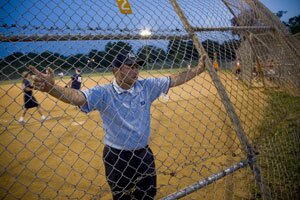
Umpire Mike Lamb
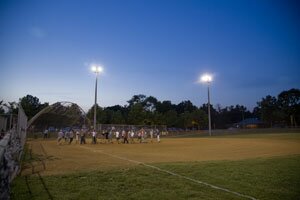
Opposing teams make post-game peace on a recent June weeknight.

Members of the coed Fresh Fire team take a moment of silence before a recent game.
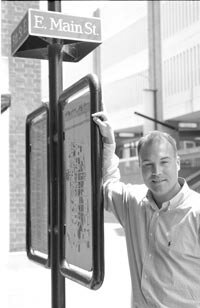
Parks Director Svetz: "We want it to be a win-win situation where we meet needs with a rectangular field and maximize the use of the fields the city and county own."
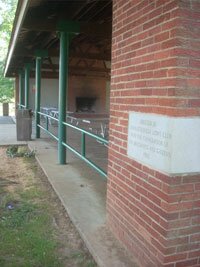
The Charlottesville Host Lions Club erected three brick picnic shelters between 1955 and 1961, and two stand in the way of the YMCA.
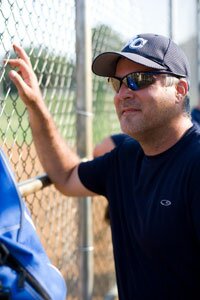
"Softball in Charlottesville is pretty competitive. It gives us a chance to relive our childhood."–coach Todd Haymans
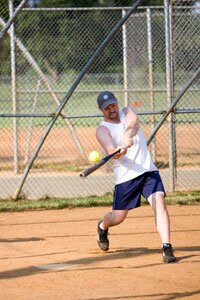
"McIntire is the central point of softball in the city."–player Chad Dillon
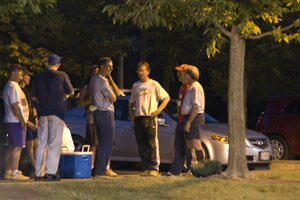
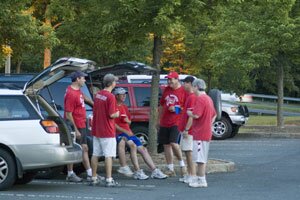
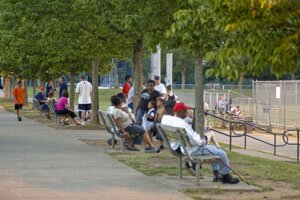
"Did we sit around after a game and have a few beers? Yes. Were there ever any fights or issues? No. My league is 100 yards away, and we've never had any problems."–Bob Schotta
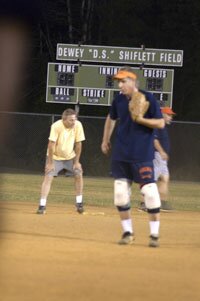
What will become of McIntire's memorial to Dewey D.S. Shiflett?

The City Council-approved plan for McIntire Park lets the annual Dogwood Festival carnival remain. However, two drive-up brick picnic shelters would be replaced by three smaller gazebos, as the YMCA takes three to five acres of land. The plan envisions an expanded parking lot, at least one new pedestrian bridge, a new t-ball field, and– most controversially– replaces two softball fields with a single artificial-turf, multi-purpose field. If it might seem that a new field could be created from the forest behind the proposed YMCA, that terrain has been declared off-limits as a "managed conservation area." As for the east side of the park, beyond the train tracks in photo, it would lose three of the nine sand-greened holes to the planned Meadowcreek Parkway, and a private group is urging this as the site of a botannical garden.
#
4 comments
"...lighting is off-limits under the terms of the donation." If that's the case, why are the City and County even discussing it? Are they thinking they'll just ignore that condition of the donation?
Leave it to the City of Charlottesville to cause a problem by making a boneheaded decision and then begging the County and citizens of Albemarle to bail them out. Bring all the softball to the County, and work out a deal for the traveling teams who arrive for tournaments to stay at any of the wonderful county hotels.
Part of the problem with the Charlottesville City Council (and DEFINITELY the staff) is they just don't understand what soft dollars are. They make Downtown as freaking impossible to access as they can, preventing touristas from spending as much as they could with easier access and a sane traffic and parking plan. They kick out the softball players who (1) pay hundreds of thousands of dollars over the year to play in the City and (2) do tend to spend some money while coming and going. If the City would just spend as much energy DOING something as they spend deciding which consultant to hire and ignore next!
I'm a die-hard Democrat, but this is what you get with one-party government - it doesn't matter if it's Republicans in DC or Democrats in Cville. No accountability (see O'Connell, Gary, RWSA, and the Bush Administration's Justice Department), no imagination, and absolutely no need to actually do anything worthwhile to keep their jobs.
What a fiasco. I'd love to see the "needs assessment" that Svetz is hiding behind. Who did they survey? I would say the 2,000 players on 160 teams are a pretty good indication of "need." And what other adult recreation opportunities are there? Bowling? Putt-putt? I guess all those softball player should sign up for the Y and go run on treadmills, or fight with the local high schols for pool time.
If they indeed can't light Towe, there will be no choice but to scale back softball in Charlottesville -- fewer teams, fewer games.
I just don't see how they are going to get MORE use out of a rectangular field than they currently get out of those two diamonds.
Remember, people, money is no object in Charlottesville with Overrun O'Connell instituting his cost saving ideas. Just make a fuss and the city's staff will be glad to buy more fields and light them. Simple. Forma an advocacy group, write up a proposal and present it to council after getting staff support. The staff will provide the necessary spin.
i think it is stupid to get rid of the softball fields at mcintire park they make more money on softball at 600 dollars a team than they ever will on soccer and softball is good recreational fun and excercise and those two fields have been there a long time.